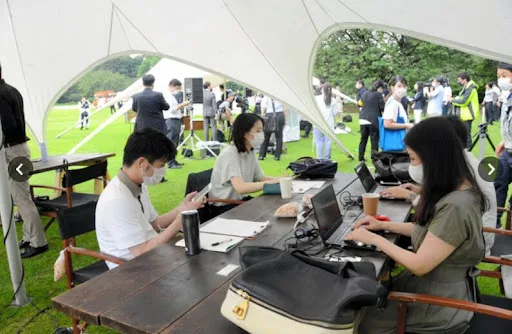With the global trend of remote work on the rise, governments are launching policies to attract digital nomads.2024 In March, the Japanese government officially announced the launch of the Digital Nomad Visa, which offers a new residency option for remote workers. The launch of this policy marks theImmigration to JapanAn important step forward in attracting international talent.
Detailed explanation of Japan's digital nomad visa policy
The Japan Digital Visitor Visa is a new visa category designed specifically for international professionals who can work remotely. Applicants with this visa can reside in Japan for up to six months, during which time they can provide remote services to overseas employers or clients and enjoy relative freedom in their work and living arrangements.
The best features of this visa areVisa-free entry and direct 6-month status of residence.. The Digital Visitor Visa offers greater flexibility in the application process and length of stay than traditional tourist or work visas. Applicants are not required to obtain a job offer from a Japanese employer in advance and are not subject to the short-term stay restrictions of a traditional visa.
Terms of application and eligibility requirements
Not all teleworkers are eligible to apply, and the Japanese government has set clear application thresholds:
Aspects of occupational requirements, applicants must be working in IT-related industries, including but not limited to software development, web design, data analysis, digital marketing, product management, and other technical positions that can be operated completely remotely. This requirement reflects the importance the Japanese government places on highly skilled digital talent.
Restrictions on the nature of workThe applicant must provide services to an overseas employer or an international client, and both the content of the work and the source of income must come from outside Japan. This requirement is intended to ensure that digital nomads do not compete with Japan's local labor force while generating foreign exchange earnings for the Japanese economy.
Income threshold requirementsAlthough no specific income standard has been officially announced, it is expected that the annual income requirement will be between 100,000 and 150,000 RMB, with reference to the digital nomad visa policies of other developed countries. This standard ensures the applicant's financial strength and is also in line with Japan's consumption level.
Family Accompaniment PolicyIf the applicant meets the eligibility requirements, he/she can bring his/her spouse and minor children along with him/her, and the whole family will be granted the same period of stay.
Analysis of Policy Advantages and Attractiveness
Significant advantages in terms of length of stayThe 6-month period of stay far exceeds that of a regular tourist visa and is sufficient to allow the applicant to experience in-depth the working and living environment of Japan while maintaining business relationships with existing clients.
Family-friendly policiesEnables the entire family to participate in this Japanese life experience. For families with school-age children, six months allows the children to experience Japan's educational environment and cultural atmosphere.
Relatively manageable economic costs. Compared to investingimmigrantsWith financial requirements that can easily run into the millions, the main cost of a digital nomad visa is centered on daily living expenses. For applicants with a steady remote income, the financial pressure is relatively low.
Outstanding geographic location advantages. Japan's geographic proximity to China and small time difference make it an ideal choice of residence for remote workers who need to stay in close contact with clients in the Asia-Pacific region.
Notes on the actual application
Preparation of language skillsIt is one of the key factors for successful residence. Although the use of English is relatively common in major cities such as Tokyo and Osaka, basic Japanese language skills are still essential for dealing with day-to-day affairs, medical services, and government procedures. Applicants are advised to master Japanese at least to the level of daily conversation before departure.
Accommodation arrangements need to be planned in advanceThe six-month period of stay is neither suitable for long-term hotel stays nor difficult to address through traditional rental channels. Flexible accommodation solutions specifically for digital nomads are now available in the market, including options such as short-stay apartments and shared living spaces.
Network Infrastructure TourCritical for remote workers. Japan has a high level of Internet infrastructure, but there are differences in the quality and cost of the network in different areas. Applicants need to choose the appropriate area of residence and Internet service provider based on their work requirements.
Tax planning should not be overlooked. Although the source of income is outside Japan, the status of residence in Japan may involve tax reporting obligations. Applicants are advised to consult a professional tax advisor in advance to plan tax arrangements appropriately.
International Digital Nomad Visa Market Comparison
Japan is not a pioneer in digital nomad visas, but its policy design has some competitive advantages.
Portugal's digital nomad visa, which requires a monthly income of no less than 2,250 euros, or about 17,000 yuan, has a relatively high threshold but can be used as a stepping stone to applying for long-term residency in the EU.

Estonia offers both short-term and long-term digital nomad visa options with relatively flexible policies and a streamlined application process.
Dubai's digital nomad visas are valid for up to a year, but the cost of living there is relatively high, especially for housing and daily spending.
In contrast, the Japanese digital nomad visa offers unique advantages in the Asia-Pacific region: relative cultural familiarity, convenient location, moderate cost of living, and well-developed infrastructure.
Possibilities for long-term migration planning
The digital nomad visa, while not an immigrant visa per se, may be an important step in subsequent immigration planning.
Through the 6-month actual residence experience, applicants can gain an in-depth understanding of various aspects of Japan's job market, living environment, educational resources, etc., providing first-hand information for subsequent immigration decisions.
Local contacts and business connections established during the period of stay may also create conditions for subsequent applications for work visas or management visas.
With the growth of the digital economy and the popularization of remote working models, governments may further relax their policy restrictions on digital nomads or even introduce longer-term residency options.

Application advice and risk assessment
For eligible IT professionals, the Japan Digital Nomad Visa does offer a low-risk opportunity to experience life abroad.
Risk control aspects, the 6-month time limit and relatively low economic costs keep the cost of trial and error manageable. Even if it is eventually found that you do not adapt to the living environment in Japan, there will be no significant loss.
In terms of earnings potentialIn addition to the enrichment of personal life experience, it may also bring new opportunities for career development. In today's increasingly globalized world, professionals with experience living abroad often have a competitive advantage.
Preparatory recommendationsThis includes: studying basic Japanese in advance, learning about the cost of living in your target city, preparing the necessary insurance and medical arrangements, and making a detailed work and living plan.
Policy outlook and development trends
The introduction of the Japanese digital nomad visa reflects a new shift in the global competitive landscape for talent. More countries are expected to introduce similar policies as technology advances and work styles evolve.
For Chinese IT professionals, this policy offers a brand new career path. Not only can they experience different work cultures and lifestyles, but they may also lay the foundation for future international development.
In the long run, the digital nomad visa may become an important channel for international talent mobility and play an important role in building a more open and flexible global talent market.
Although the Japanese digital nomad visa has just been launched, its policy design and market positioning show a strong appeal. For remote workers who are in a position toMoving to JapanThis is indeed an option that deserves serious consideration.






